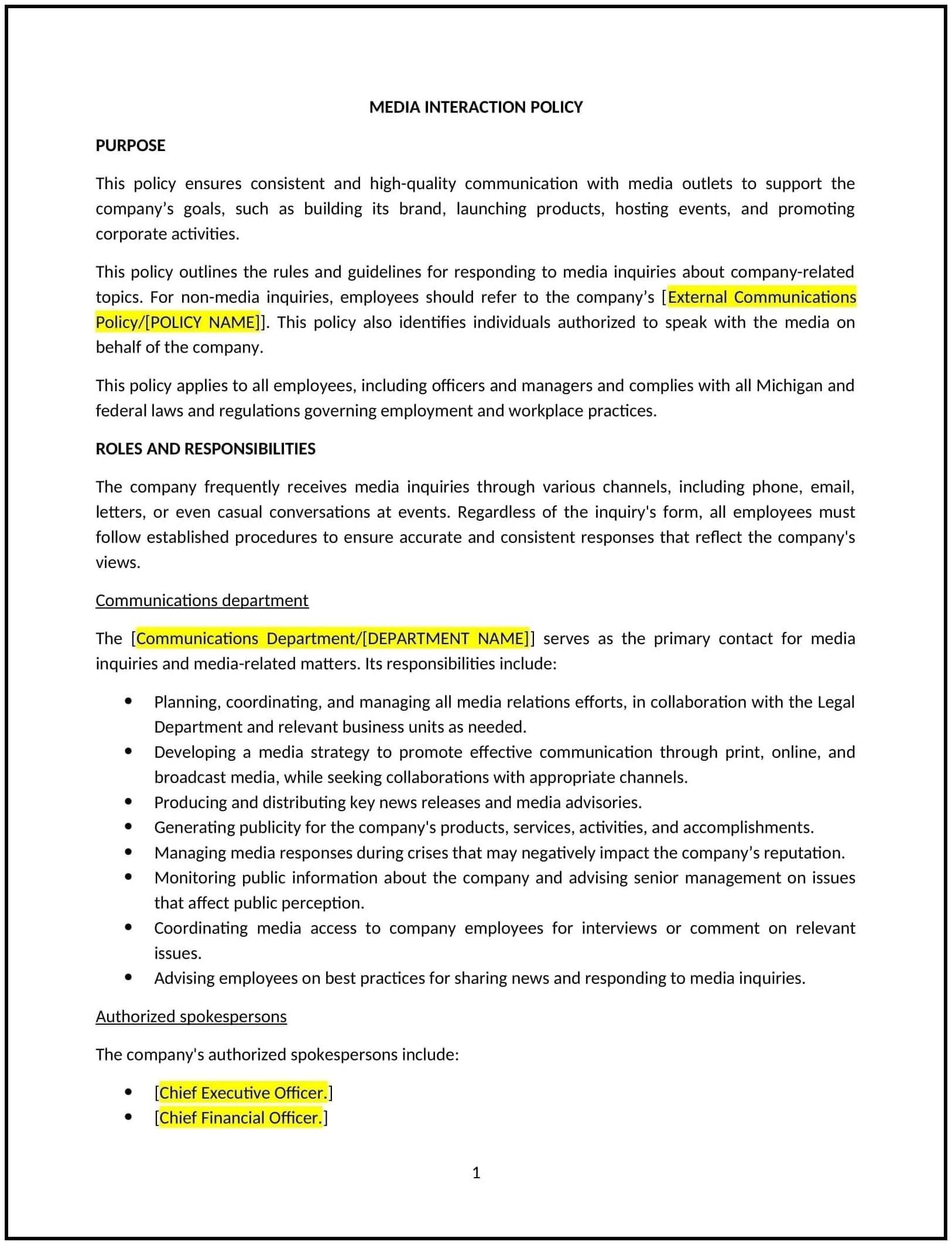Got contracts to review? While you're here for policies, let Cobrief make contract review effortless—start your free review now.

Customize this template for free
Media relations policy (Michigan)
A media relations policy provides Michigan businesses with guidelines for managing interactions with the media, including press inquiries, interviews, and public statements. The policy outlines who is authorized to speak on behalf of the business, how to handle media requests, and how to maintain a consistent, positive public image.
By adopting this policy, businesses can ensure that media interactions are professional, on-message, and in line with the company’s values, while protecting sensitive information and minimizing the risk of miscommunication or reputational damage.
How to use this media relations policy (Michigan)
- Define authorized spokespersons: Specify who within the business is authorized to speak to the media, such as senior management, public relations staff, or a designated media relations officer.
- Set guidelines for media interactions: Establish clear guidelines for how employees should handle media inquiries, including directing questions to the designated spokesperson and avoiding personal opinions or unauthorized comments.
- Control messaging: Ensure that all media communications are consistent with the business’s key messages, values, and objectives. The policy should encourage spokespersons to stay on-message and avoid divulging sensitive or confidential information.
- Outline procedures for responding to media requests: Provide procedures for handling media requests, including how to respond to inquiries, how to schedule interviews, and how to prepare for media interactions.
- Address social media interactions: Define the role of social media in the business’s media relations strategy and establish guidelines for how employees should engage with the media through social media platforms.
- Maintain confidentiality: Emphasize the importance of maintaining confidentiality when responding to media inquiries, ensuring that sensitive company information or trade secrets are not disclosed without proper authorization.
- Prepare for crisis communication: Outline how the business should handle negative media coverage or crises, including how to respond to criticism or public relations challenges in a timely and strategic manner.
- Review and update regularly: Periodically review and update the policy to ensure it remains relevant and aligned with current media trends, changes in Michigan laws, and evolving business objectives.
Benefits of using this media relations policy (Michigan)
This policy provides several key benefits for Michigan businesses:
- Protects brand reputation: A clear media relations policy helps businesses manage their public image by ensuring that all media interactions are consistent with the company’s messaging and values.
- Prevents miscommunication: By establishing who can speak to the media and how to handle inquiries, businesses reduce the risk of miscommunication, unauthorized disclosures, or conflicting statements that could harm the brand.
- Ensures legal compliance: The policy helps businesses comply with Michigan state laws and federal regulations, such as those related to public disclosures, intellectual property, and defamation.
- Strengthens relationships with the media: By establishing professional and positive relationships with the media, businesses can improve their public relations and generate favorable coverage.
- Promotes transparency: The policy encourages transparency and ensures that all media communications reflect the business’s commitment to honesty, integrity, and accountability.
Tips for using this media relations policy (Michigan)
- Communicate the policy: Ensure that all employees are aware of the media relations policy by including it in the employee handbook, during onboarding, and through regular communications about handling media inquiries.
- Train spokespersons: Provide media training for designated spokespersons to ensure they are prepared for interviews and public appearances. They should be able to handle media questions professionally and stay on-message.
- Monitor media coverage: Regularly monitor media coverage of the business to assess the effectiveness of the media relations strategy and respond to any issues that arise in the press.
- Maintain consistent messaging: Ensure that all communications, including press releases, interviews, and social media posts, are aligned with the business’s core messages and values.
- Be prepared for crises: Have a crisis communication plan in place that can be activated in the event of negative press or a public relations challenge. This should include designated spokespeople, a clear message, and a strategy for addressing the issue.